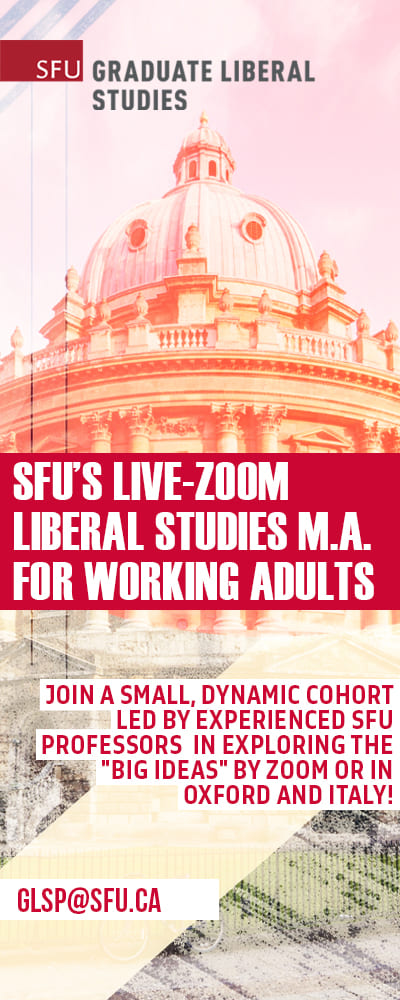#154 Jim Wong-Chu (1949-2017)
Jim Wong-Chu (1949-2017)
An obituary by Alan Twigg
First published Aug. 15, 2017
*
Chinese Canadians weren’t granted the federal vote in Canada until 1947 and they first voted provincially in 1949–the year Jim Wong-Chu was born in Hong Kong on January 28th.
Jim Wong-Chu was brought to Canada, aged four, in 1953 where he was raised by aunts and uncles as a ‘paper son’ with false documents. Aged seven, he learned that the woman he thought was his mother was an aunt who has lost a child born about the same time as him. He would not be able to unite with his biological family in his adopted land until many years later. He spent much of his childhood in the town of Merritt where he worked in Chinese cafes doing chores after school and on weekends. He peeled so many potatoes–150 pounds per day–that he was eventually able to do the job without looking.

As a young man he came to Vancouver and worked for BC Ferries. This led to a job as a letter carrier for Canada Post. Before he became “the Moses of Asian Canadian literature,” he relearned Cantonese in Vancouver and worked as a community volunteer. The stories he gathered from the Chinese Canadian community educated him about the racial injustices faced by previous generations and also emboldened him to fashion his own identity as someone who became a Canadian under fraudulent circumstance that were not of his own making.
Accurately described by Tom Hawthorn in a Globe & Mail obituary as “a serious and determined figure,” he eventually was able to buy a modest house at 311 East 41st Avenue that became a germinating for advancing literary and cultural concerns. Jim Wong-Chu became very involved in the Pender Guy radio program on Vancouver Co-op Radio, now cited as the first English-language program devoted to Chinese Canadians. From 1973 onwards, he was also involved in a private photographic mission to document life in Vancouver’s Chinatown. His ambitions were more social than literary, but after one his own poems called old chinese cemetery (kamloops, 1977/july appeared in an anthology of Japanese and Chinese writers called Inalienable Rice in 1979, he began to favour writing over photography.
His 63-page poetry book pertaining to Vancouver’s Chinatown, Chinatown Ghosts, which appeared in 1986 from Pulp Press, as now viewed as the first such collection by a Chinese Canadian. With encouragement from publsher Scott McIntyre, this led to a collaboration with Vancouver lawyer Bennett Lee, a third-generation Chinese Canadian from Victoria, for their co-edited anthology of contemporary writing by Chinese Canadians, Many-Mouthed Birds: Contemporary Writing by Chinese Canadians (D&M 1991). While searching for content, Wong-Chu came across Wayson Choy’s short story, The Jade Peony. Although this story by the first Chinese Canadian graduate of UBC’s Creative Writing department had appeared in various publications, the story goes that its appearance in the anthology kick-started the process whereby Choy was encouraged to expand the story into the acclaimed novel of the same name.
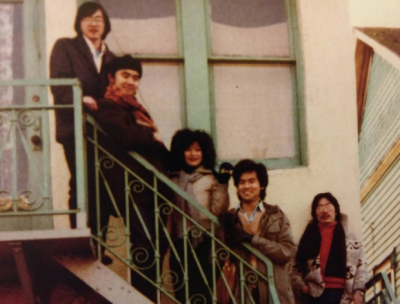
Wong-Chu became a founding member of Asian Canadian Writers Workshop and he was interviewed by Jurgen Hesse for inclusion in Hesse’s In Voices of Change: Immigrant Writers Speak Out (Pulp Press, 1990 / pages 184-201).
HERE JIM WONG-CHU COMMENTS ON THE EVOLUTION OF ASIAN CANADIAN LITERATURE FOR AN ARTICLE IN BC BOOKWORLD:
“Most of the early pioneers of the Asian Canadian literary canon didn’t start off with aspirations of writing. They were community activists who grew up with racial discrimination and wanted change. They were compelled to write.
“People like SKY Lee and Paul Yee worked full-time jobs, but they needed to get their stories out there. Paul Yee was an archivist who knew a lot about Chinatown. But he wasn’t a writer. One day, Lorimer Books commissioned Rick Shiomi, a Japanese Canadian playwright, to craft a children’s book with an Asian Canadian theme. Rick ran out of time and rather than letting the project fall through, Paul stepped up and tried his hand at writing.
“That book, Teach Me to Fly, Skyfighter!, in 1983, is seminal because it was one of the first to depict life growing up in Chinatown. It was the first Canadian book that touched on that topic. It was a turning point when we realized that someone outside of the so-called literary establishment could publish, too.

“My book, Chinatown Ghosts, happened very much by serendipity. I trained in photography but I entered the creative writing program at UBC and tried my hand at poetry. I realized after two years that no one understood my writing which mainly revolved around Chinatown. I eventually realized writers of Asian descent needed some sort of organization that could get together to workshop and be comfortable in sharing stories that spoke about themselves.
“Chinatown Ghosts was a culmination of those two years of creative writing classes at UBC. I never intended to publish it. I hung out at Alvin Jang’s place one day. He was a visual artist who happened to be close friends with J. Michael Yates, a renowned Canadian author. After Alvin showed my poems to Yates, he came to me one day and said, “Give me everything you have. I’m going to be your editor.”
“It turned out that Arsenal Pulp Press needed one more book to fulfill its Canada Council grant and Yates was asked to search for manuscripts. With Yates as editor, Chinatown Ghosts immediately had legitimacy. It was published within five months.
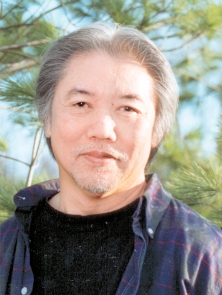
“Wayson Choy is a case of hidden talent waiting to be discovered. It only took thirty years. Scott McIntyre came to me and asked if Bennett Lee and I could put together an anthology of Asian Canadian writers. In those days, there weren’t that many, so I scoured the UBC Library stacks searching for anything published by Asian Canadian writers in literary magazines. That’s where we found Wayson Choy.
“Although Wayson’s short story called Jade Peony had already been published in other anthologies, its inclusion in Many-Mouthed Birds: Contemporary Writing by Chinese Canadians, brought it into the spotlight as an Asian Canadian story. There were actually three stories by Wayson Choy that we shortlisted and Jade Peony wasn’t Wayson’s first choice. However, Douglas & McIntyre liked the story so much that it not only accepted it, but gave Wayson a contract to develop it into a novel.
“The Asian Canadian literary scene began mainly with Chinese and Japanese writers because historically they have been in Canada the longest. But times have changed. Other groups are emerging with recent immigration, from places such as Korea, Laos, Vietnam, the Philippines, etc. We’ve seen excellent writing from the likes of Madeleine Thien, Vincent Lam and Kim Thuy, just to name a few.
“The hyphenation of Asian Canadian is a residue of historical circumstances. I’ve noticed that not all of them define themselves as Asian Canadian and prefer to drop the hyphen. And that’s fine. We’re all Canadian writers first and foremost. It’s more important to continue to find the hidden talents in our communities, people who aren’t used to having their voices heard, rather than become sidetracked by identity.”
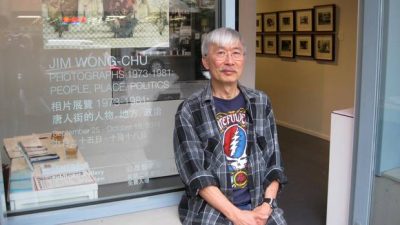 In 2014, at the Vancouver International Centre for Contemporary Asian Art, an exhibit called Jim Wong-Chu: Photographs 1973-1981: People, Place, Politics consisted of nearly 100 black-and-white photographs taken by Jim Wong-Chu during the years he attended Emily Carr, then known as the Vancouver School of Art.
In 2014, at the Vancouver International Centre for Contemporary Asian Art, an exhibit called Jim Wong-Chu: Photographs 1973-1981: People, Place, Politics consisted of nearly 100 black-and-white photographs taken by Jim Wong-Chu during the years he attended Emily Carr, then known as the Vancouver School of Art.
In 2015, Wong-Chu co-edited AlliterAsian: Twenty Years of RicePaper (Arsenal Pulp $21.95) an anthology. AlliterAsian includes interviews with David Suzuki, Tobias Wong, Ruth Ozeki, Evelyn Lau, Denise Chong and Madeleine Thien; plus excerpts from works-in-progress by Joy Kogawa, Yasuko Thanh and SKY Lee; and poetry from Fred Wah, Rita Wong, Souvanhkahm Thammavongsa and Michael Prior. Other contributors are Kim Fu, Doretta Lau, Corinna Chong, Terry Watada, Derwin Mak, Eric Choi and C.E. Catchalian. Noteworthy AsianLit trailblazers Wayson Choy, Paul Yee and Lily Chow are absent from this anthology.
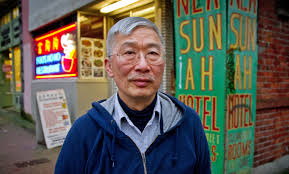 With collaborators, Wong-Chu has also edited two more antholgies of Chinese-Canadian literary works: Swallowing Clouds: An Anthology of Chinese-Canadian Poetry (1999) and Strike the Wok: An Anthology of Contemporary Chinese Canadian Fiction (2003). [Multi-media artist Paul Wong’s Yellow Peril: Reconsidered has showcased the work of 25 Asian Canadian artists and essayists.]
With collaborators, Wong-Chu has also edited two more antholgies of Chinese-Canadian literary works: Swallowing Clouds: An Anthology of Chinese-Canadian Poetry (1999) and Strike the Wok: An Anthology of Contemporary Chinese Canadian Fiction (2003). [Multi-media artist Paul Wong’s Yellow Peril: Reconsidered has showcased the work of 25 Asian Canadian artists and essayists.]
Jim Wong-Chu suffered a stroke in March of 2017 and died on July, 11, 2017. He was survived by his wife Marlene Enns, a stepdaughter, three brothers, three sisters and his mother. He was a hard man to make happy. But his stern countenance did not prevent him from being greatly respected and loved by those who knew him well.
*
BOOKS:
Chinatown Ghosts (Pulp Press, 1986)
Many-Mouthed Birds (D&M, 1991) co-editor.
Swallowing Clouds: An Anthology of Chinese-Canadian Poetry (1999)
Strike the Wok: An anthology of contemporary Chinese Canadian fiction (Toronto: TSAR Publications, 2003) edited by Lien Chao and Jim Wong-Chu.
AlliterAsian: Twenty Years of RicePaper (Arsenal Pulp 2015) co-editor $21.95 978-1-55152-620-1
*
The Ormsby Review. More Books. More Reviews. More Often.
Publisher and Editor: Richard Mackie
The Ormsby Review is a journal service for in-depth coverage of BC books and authors. The Advisory Board consists of Jean Barman, Wade Davis, Robin Fisher, Cole Harris, Hugh Johnston, Kathy Mezei, Patricia Roy, Maria Tippett, and Graeme Wynn. Scholarly Patron: SFU Graduate Liberal Studies. Honorary Patron: Yosef Wosk. Provincial Government Patron since September 2018: Creative BC
“Only connect.” – E.M. Forster




























